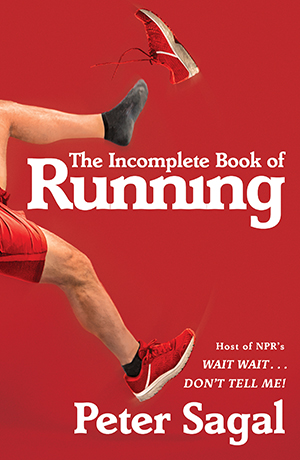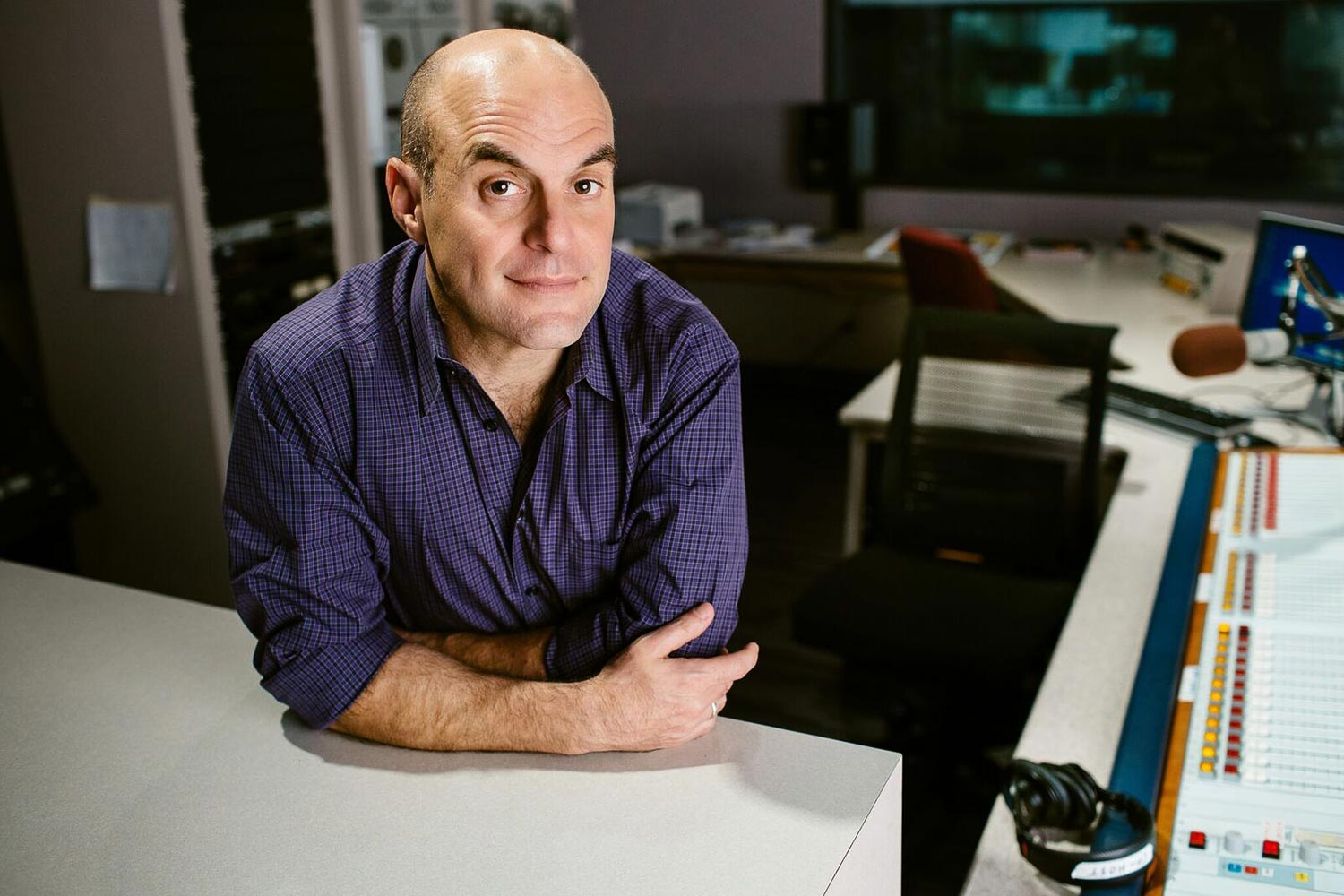A lot happened to Peter Sagal, host of the popular NPR quiz show Wait, Wait … Don’t Tell Me! and devoted member of the Oak Park Runners Club, since he first proposed writing “a breezy guide to running as a midlife marathoner.” First, there was his bitter divorce, which strained his relationship with his daughters; then, in 2013, he and the blind runner he was guiding crossed the finish line of the Boston Marathon moments before two bombs detonated.
The title of the work he eventually completed — The Incomplete Book of Running (Simon & Schuster) — pays homage to Jim Fixx’s influential 1977 tome The Complete Book of Running. And, it’s a nod to the fact that this is more memoir than training guide: “It’s about a year in my life in which running played a significant role, not just as something I was doing but also that — I figured out later — shaped my reactions,” Sagal says.
Chicago magazine spoke to Sagal about his shifting motivations, his fastest marathon, and how writing about running is truly writing about life.
When did you start running — and why did you return to it as an adult?
I started running when I was 15 and very dissatisfied with who I was, how I looked, and what my life was like as a bookish socially awkward adolescent. I restarted running seriously at the age of 40 for similar reasons, like a lot of people. I don’t know if that’s the healthiest reason to do something, but the benefits are undeniable. So I guess you’ll take what motivation you can.
And when did you start writing about it?
In 2007, I was profiled in Runner’s World and joked that one of the frustrating things about running is there’s not enough crap to buy. The editor called me and said, “Would you like to be our gear columnist?” For about a year and a half, I reviewed new running products. It was great fun, but I would always write more or less the same thing: This is amusing, but it’s not really going to help you run. That turned out to be a problematic message for a magazine supported by advertisers trying to sell crap to people who run.
So I said, Would you mind if I write about something else? And my editor said, “Please.” So I became a general interest running columnist. At the beginning I thought, What are you going to say? Running: right, left, right or left, right, left? But I continually surprised myself. A lot of the things I thought about got worked into the book.

The book discusses difficult personal issues — your divorce, your depression. How does it feel to be so open and serious?
People have said hearing me talk about my struggles or issues made them feel like they’re not alone. I want to be careful about this, but — there are certain problems it’s noble to have. If you are unfortunate enough to be diagnosed with cancer, you are a hero in your fight. If you have an extremely unpleasant divorce and severe family trauma, you are somebody who is probably at fault. You feel isolated and uniquely incompetent at this thing called life. To speak about it even cautiously and vaguely is, I think, to give hope to other people going through their own things.
How has running — which you talk about as a practice of persistence — influenced your experience of those challenges?
I had thought that the main benefit of running is the obvious — you improve your mood through endorphins, you get away from your troubles, you get some exercise and perspective. All those things are true. But the thing I didn’t understand before is the entire time I was training seriously as a runner, I was actually training to go through what I have been going through since my marriage dissolved — to endure something very difficult, to stay a course, even though it’s extraordinarily painful and the rewards of quitting are right there.
When you’re running in a marathon and it just sucks and you pass the medical tent, you say to yourself: “All I need to do is stop running and walk over there and they’ll put a blanket around me and give me hot coffee and a ride back to my hotel.” But you don’t. You keep going. That turned out to be good practice for what I eventually faced.
In one chapter, you describe your quest to run your personal best marathon at age 46. What was that like?
I ran a 3:20 at the 2006 Chicago Marathon, qualifying for the Boston Marathon. Over the next few years my times were creeping slowly upward. It bothered me. So I decided to see if it could be done, to run a faster marathon at an age when you are supposed to be slowing down.
I did it by training carefully and very hard, modifying my nutrition and my attitude — all of which I write about. My joke is that if I ever applied myself to any of my actual work as much as I did to that project, I would have won a MacArthur grant or a Nobel Prize by now. I pulled it off better than my wildest dreams. I ran a 3:09 in Philadelphia in 2011, the fastest marathon I’ve ever run — and, I think I need to say, ever will run.
Why do you say that?
In addition to the degradations of age, which are real, the fire in my belly to do it was extinguished. I didn’t have anything more to prove. That’s when Josh Warren of Team with a Vision showed up. All four of my subsequent marathons, including 2013, have been as guides for blind runners. When I was running Boston with William Greer in 2013 and again with Erich Manser in 2014 and 2015, I felt more comfortable and assured. It’s really useful to have someone else to worry about; you stop worrying about yourself. There’s a lesson in there, I think.
This book isn't a how-to, but it still offers advice — what would you tell new runners?
Thinking of exercise as an unpleasant necessity you need to do because if you don’t, you’ll be fat or dead — that’s not a good motivation. What’s better is deciding you want to accomplish something difficult, then doing something to achieve it. Most people are able to do that. Hell, there are people who are committed to Fortnite and what they do is practice so they can kill their friends come the weekend.
Similarly, if you want to run, give yourself a goal: I want to be able to run my neighborhood 10K in the spring. Paying 60 bucks and walking away with a fairly cheap medal is not the most world-shakingly important goal, but you can reach it and you’ll feel really good when you do.
Also, ignore all the people trying to sell you stuff, from magazines to $4,000 treadmills, dangling models — literally, hairless fitness models — of what you supposedly can achieve. You are not running to become someone else better than you. You are trying to become the best version of yourself.
Your life looks different now than it did when you began this book. What role will running have in it?
I’m not going to stop. I hope to keep running with blind and other disabled runners who need guides. In a world in which people feel depressed by large global events — when the world itself seems to be falling apart — to help one other person in a small way can be hugely healing. I’m also hoping to be an elder statesmen of running. People will say: “I saw Peter Sagal at the race, he wasn’t very fast, but it was nice to see him.” I’m looking forward to that.




